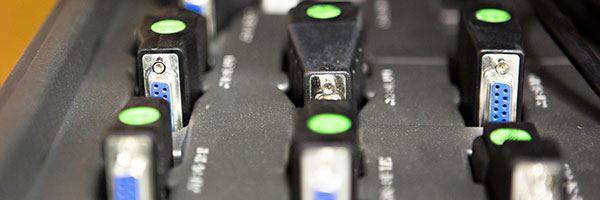Make an Appointment
Check Engine Light
When your car's check engine light comes on, it can be a frustrating experience since it can be caused by any number of reasons. Since modern vehicles have computer systems that control much of the car, the check engine light can be caused by a computer issue. Diagnosing a car's computer system can be a complicated process. At Sallas Auto Repair, we have the advanced diagnostic tools necessary to find the reason behind the light.

Common Causes For The Check Engine Light
There are some pretty common causes for the check engine light to come on. Without reading the car's computer, you won't be able to diagnose the problem, so it's best to have the actual reason diagnosed. Here are the most common reasons behind a check engine light.
Loose Gas Cap
A loose gas cap can actually cause fuel vapors to escape from the car and confuse the fuel system. If your gas cap is loose or wasn't screwed on properly, tightening the gas cap can eliminate the problem. You may also want to check your gas cap for any cracks.
Faulty Oxygen Sensor
The oxygen sensor is located in your car's exhaust and it carefully monitors the amount of oxygen remaining from your fuel after combustion occurs. Some fuels are considered "rich" meaning they have less oxygen left over than the typical ratio of air to fuel. "Lean" fuels have too much oxygen remaining after combustion. Both of these scenarios can negatively affect your vehicle and the environment. Your car's oxygen sensor monitors the ratio of air to fuel and makes adjustments to keep your car running efficiently. Over time, an oxygen sensor can stop reading correctly if it gets covered in oil ash.
Typically replacing an oxygen sensor is not a costly repair (except in some European vehicles). However, if you do not have an oxygen sensor replaced in a timely manner, it can lead to a much more expensive repair by ruining your catalytic converter.
Mass Air Flow Sensor
The mass air flow sensor tells the computer how much fuel to add to the engine based on how much air is coming from the engine after combustion. Typically a mass air flow sensor reading can actually be caused by the car's air filter. If the air filter was not installed properly, or if it hasn't been changed in a while (you should have your air filter changed on a regular basis), it can give a false reading to the mass air flow sensor.
It's important to have this issue inspected by a professional mechanic because a problem with your mass air flow sensor not only reduces your gas mileage, but it can also cause your car to stall out, leaving you stranded on the road.
Failing Spark Plug
A failing spark plug can cause a misfire in your spark plugs, leading to less power in your car, sluggish performance, and ultimately it can damage your catalytic converter. If a spark plug is failing, your check engine light will typically blink on and off. Although a problem with your spark plugs mostly likely won't leave you stranded on the side of the road, it's important to have a spark plug problem corrected immediately.
The Bottom Line
The bottom line regarding the check engine light is that it can be caused by a variety of items. The best thing to do is to have a professional hook up a diagnostic tool to your car's computer and inform you of the code. Don't let a check engine light go for too long without being checked.
Call Sallas Auto today to have a specialist diagnose the reason your light came on.